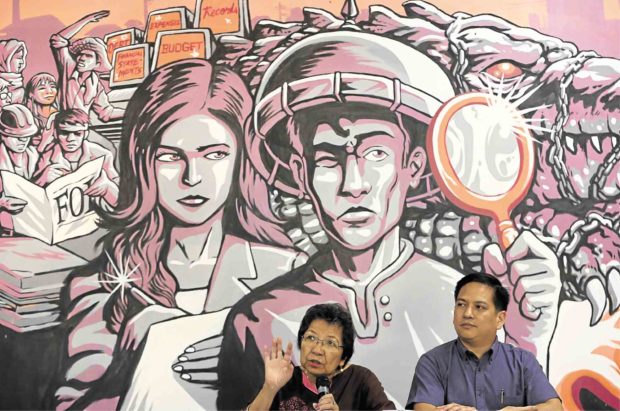
ROME STATUTE EXPLAINED Etta Rosales, former chair of the Philippine Coalition for the
International Criminal Court (ICC), and Ray Paolo Santiago, current chair, say the Rome Statute
and the ICC were crafted for the protection of the people against crimes against humanity. NIÑO JESUS ORBETA
Human rights campaigners defended the Rome Statute and the International Criminal Court (ICC) from President Duterte, reminding him that these were mechanisms to protect the people from impunity and prevent despotic leaders from getting away with murder.
“This would be promoting impunity rather than protecting the people from impunity,” said Jose Manuel Diokno, national president of the Free Legal Assistance Group and dean of De La Salle University College of Law.
Diokno told the Inquirer on Wednesday that the President’s decision would make it more difficult “for anyone to hold government officials accountable” for violations of crimes against humanity and grave violations of human rights, especially so that criminal charges in the country cannot be filed against a sitting President.
Network of NGOs
On Thursday, the Commission on Human Rights (CHR) office became the venue of the press conference by the Philippine Coalition for the International Criminal Court (PCICC), a network of nongovernment organizations (NGOs) that worked for the Philippines’ ratification of the Rome Statute, which established the ICC.
“When despotic leaders and authoritarian leaders try to defend themselves against the principles of the Rome Statute and other instruments [like the ICC], we should always take into account that these instruments were crafted for the protection of the people against such crimes against humanity,” said former CHR Chair Etta Rosales, also a former chair of the PCICC.
It was quite the reverse with the President’s men, Rosales said. “Why are they protecting him? The ICC was set up precisely to try despotic leaders who get away with murder because impunity is the central question, the abuse of power.”
PCICC Chair Ray Paolo Santiago said Mr. Duterte ought “to change his mind and realize that this is not about him.”
“This is a mechanism that would address impunity for the benefit of the Filipino people,” he said.
Bottom line of ICC probe
The bottom line of the preliminary examination of the ICC is that the international community wants the Philippine government to end the extrajudicial killings, said CHR Commissioner Roberto Cadiz.
In Buhi, Camarines Sur, Vice President Leni Robredo said Filipinos would be vulnerable to tyrants without the legal remedy of haling them to the ICC.
In the House of Representatives, Albay Rep. Edcel Lagman said Mr. Duterte’s refusal to be investigated by the ICC on charges of crimes against humanity was a “virtual admission of culpability since innocence does not select or discriminate a forum.”
Ifugao Rep. Teddy Baguilat Jr. reminded the President in a statement that “he represents the people and the country, which belongs to a community of nations unless it’s our desire to be a pariah among nations.”
Accountability
The former law firm of presidential spokesperson Harry Roque warned that Mr. Duterte and others responsible for extrajudicial killings in the war on drugs could not evade accountability.
“The rules of the ICC are clear that it has jurisdiction over crimes committed in a state’s territory while the latter was a party to the Rome Statute,” Centerlaw said in a statement.
Two Catholic bishops also joined those criticizing Mr. Duterte’s decision.
Manila Auxiliary Bishop Broderick Pabillo said the President “cannot just set aside” the country’s commitment to human rights in the international community.
“The reason always given by leaders when they are investigated is that there is no jurisdiction and only political movements. They are afraid of accountabilities. Duterte should be investigated!” Pabillo said. —WITH REPORTS FROM DJ YAP, JULIE M. AURELIO AND DONA Z. PAZZIBUGAN